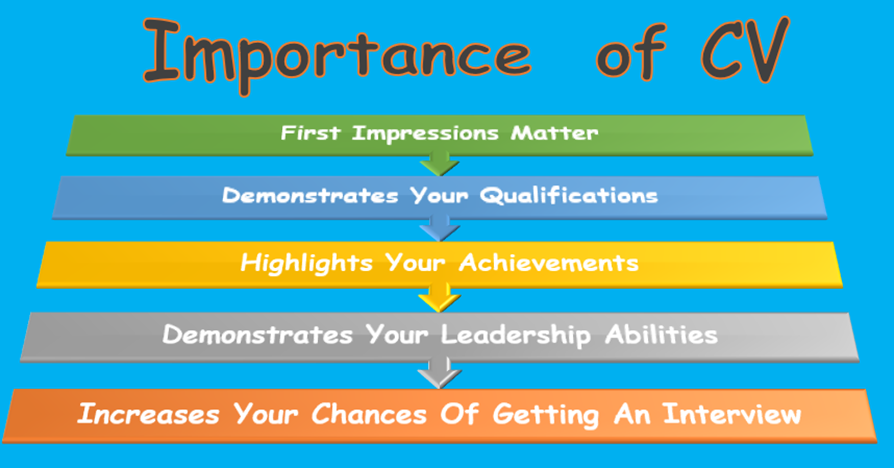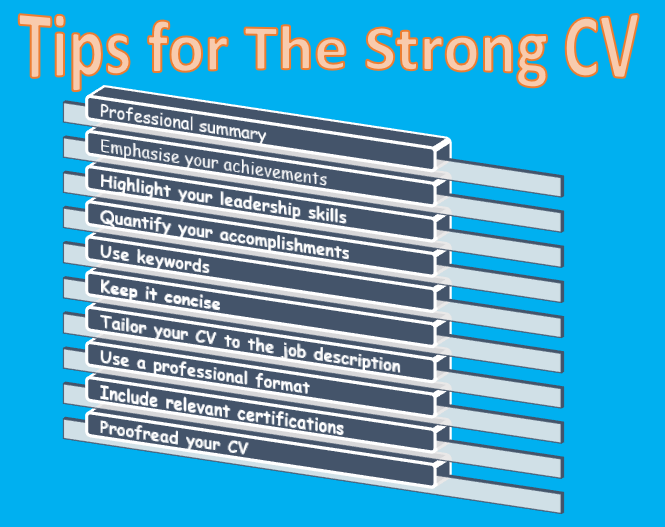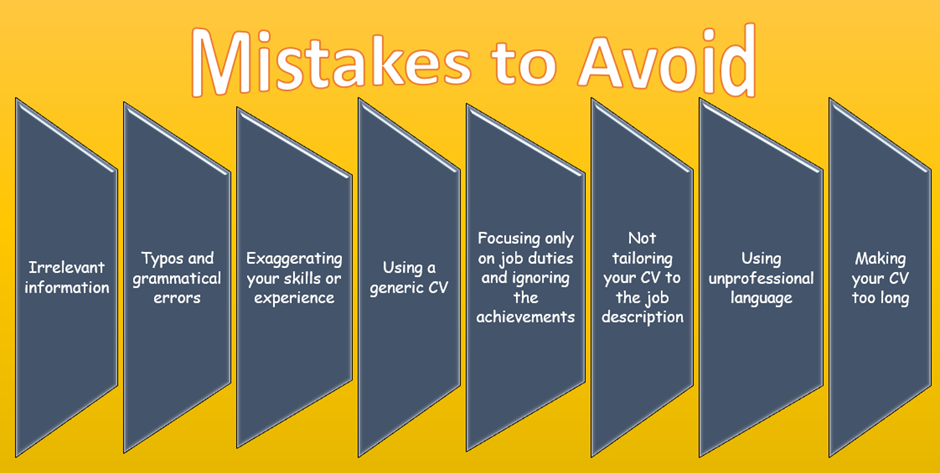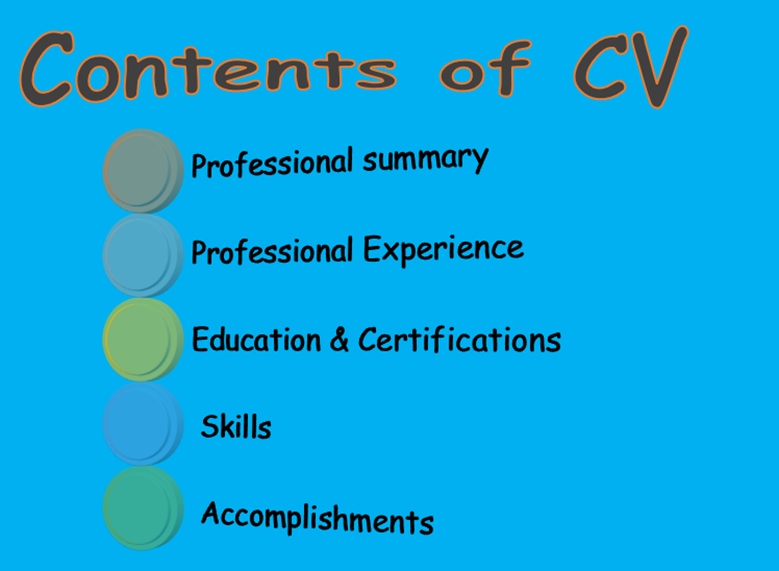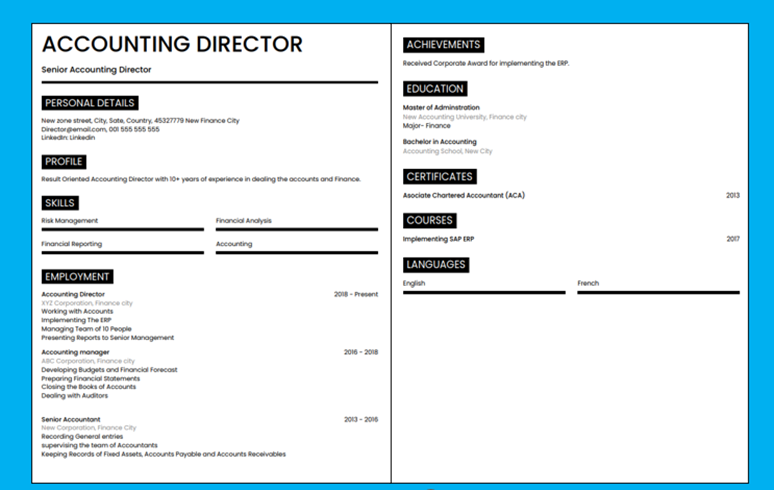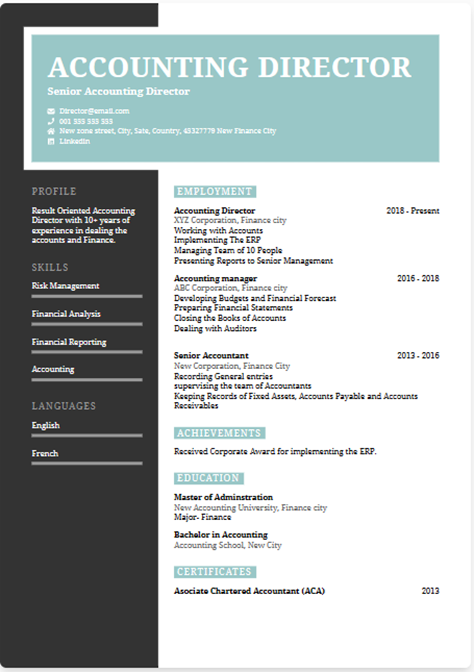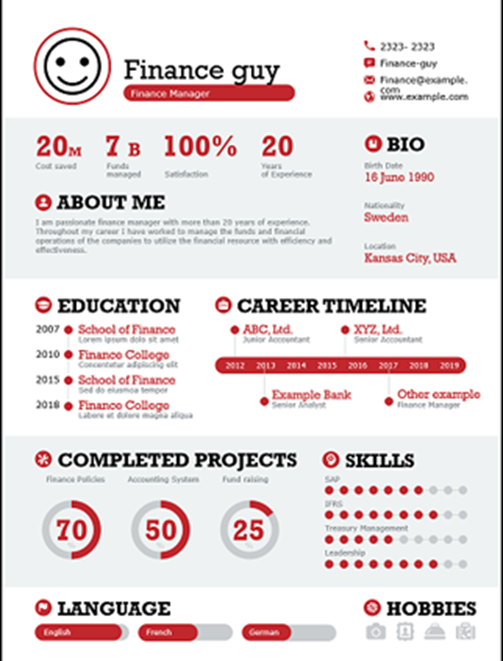Your CV is usually the first impression of you that a potential employer sees. It is a document that showcases your skills, experience and achievements and highlights why you are the best candidate for the job. If you’re an accounting director, your CV needs to show you can manage the accounting department. You must also show you can lead a team and make decisions that affect the company’s profits.
 Photo by Lukas Blazek on Unsplash
Photo by Lukas Blazek on Unsplash
The Importance of a Strong CV
A strong CV can help you stand out from the other applicants and get the job you want. Here are some reasons why a great CV is so important for the role of an accounting director:
- First impressions matter. Your CV is often the first impression a potential employer will have of you. You can stand out from other applicants. A well-written, well-presented CV can make a positive first impression.
- Demonstrates your qualifications. A great CV highlights your qualifications for the role. It includes your education, work experience, and relevant skills. This can help show potential employers that you have the necessary qualifications. You can be successful in an accounting director role.
- Highlights your achievements. Your CV should show your accomplishments in past roles. These include cost savings, process improvements, and successful audits. This can prove your ability to add value to an organisation and help it achieve its financial goals.
- Demonstrates your leadership abilities. As an accounting director, you will be responsible for leading a team of finance professionals. Your CV should highlight your leadership skills. These include leading teams, coaching and problem-solving
- It increases your chances of getting an interview. Having a strong CV can help you attract the attention of companies. It can also increase your chances of getting an interview. It can also help you stand out from the other candidates who may have similar qualifications and experience.
Tips for Creating the Best CV for an Accounting Director Role
Writing a strong CV is so important for landing the desired job that many people hire the services of a professional CV writer. The following are tips for creating the best CV for an accounting director role:
- Your CV should start with a summary that highlights your key skills and accomplishments as an accounting director. This should include your years of experience, areas of expertise and any notable achievements.
- Instead of simply listing your job duties, focus on your achievements in each role. Use specific examples to showcase how you have added value to your previous employers.
- As an accounting director, you will be responsible for managing teams of finance professionals. Make sure to highlight your leadership skills and experience leading and motivating teams.
- Use numbers and data to quantify your achievements. For example, don’t say you “improved financial processes.” Say you “streamlined financial processes.” This change led to a 20% cut in monthly close time.”
- Include keywords for the Accounting Director role. These are words like financial analysis, budget management, and strategic planning. This will make recruiters and hiring managers take a closer look at your CV.
- Your CV should be no more than two pages long. Make sure to only include information that is relevant to the role and avoid going into unnecessary detail.
- Make sure to customise your CV for each job for which you apply. Highlight the skills and experiences that are most relevant to the job description.
- Your CV should be well-organised and easy to read. Use a professional format that includes clear headings and bullet points.
- If you have any relevant certifications, such as a CPA or ACCA, make sure to include them on your CV.
- Before submitting your CV, make sure to proofread it for any spelling or grammar errors. Ask a friend or colleague to review it as well to ensure it’s error-free.
By following these tips, you can create a strong CV that highlights your skills and experience as an accounting director. This will increase your chances of landing your dream job.
Things To Avoid Whilst Writing a CV
When writing a CV for an accounting director role, certain things can leave a bad impression on the reader. By avoiding these common mistakes, you can create a strong and effective CV for an accounting director role. Here are some examples:
- Avoid going into unnecessary detail or including irrelevant or personal information. This includes your age, marital status, and photograph. Your CV should be no more than two pages long.
- Spelling and grammatical mistakes can leave a negative impression on potential employers. Make sure to proofread your CV carefully, and consider having someone else review it as well.
- Exaggerating your qualifications can lead to disappointment and lost opportunities. So, be honest about your skills and experience.
- Instead of just listing your job duties, focus on your achievements and accomplishments in each role. Use specific examples to show your impact.
- Make sure to customise your CV for each job you apply for. Tailor your skills and experience to the specific requirements of the job description.
- Your CV should be written in a professional tone. Avoid using slang or informal language.
Recommended Content for an Accounting Director CV
Professional Summary
Start your CV with a professional summary that highlights your experience and skills. This section should fit the job description. It should give a snapshot of your professional experience. This includes your years of experience in accounting, financial management, and team leadership. Use this section to showcase your top skills and achievements and make a strong first impression on the employer.
Example: “I am a results-driven accounting director. I have over 10 years of experience in financial management, accounting, and team leadership.” implemented cost-saving measures, streamlined financial processes and led successful audits. I have strong skills in communication and leadership. I have proven I can handle complex finances and give strategic direction.”
Work Experience
The professional experience section is the most important part of your CV. It provides an overview of your previous job experiences in financial accounting, finance or related fields. Use bullet points to describe your responsibilities, achievements and notable projects. Make sure to highlight your accomplishments. This includes cost savings, better processes, or successful audits. Use quantifiable data whenever possible to show the impact of your work on the organisation’s bottom line.
Example: Accounting Director, XYZ Company (2016 – Present)
- Led accounting operations for a $50 million company, managing a team of 10 finance professionals.
- Streamlined financial processes resulted in a 20% reduction in processing time and a 15% reduction in costs.
- Led many audits, resulting in zero audit findings and improved audit ratings.
- I developed and implemented financial policies. This led to better controls and more transparency.
Education and Certifications
Include your educational qualifications, including your degree, major and any relevant certifications. This section should also highlight any special training or courses. They should be in accounting, finance, or related fields. Be sure to list any certifications or licenses that are relevant to the position, such as ACA, CPA, ACCA, etc.
Example:
- Education: Bachelor of Science in Accounting, XYZ University
- Certifications: Associate Chartered Accountant (ACA)
Skills
List your technical and soft skills that are relevant to the position. Technical skills may include accounting software skills, financial analysis or budget management. Soft skills may include communication, leadership and problem-solving abilities. Be sure to tailor this section to the specific job description and highlight the skills that are most important for the role.
Example:
- Financial analysis and forecasting
- Budget management and cost control
- Team leadership and management
- Excellent communication and interpersonal skills
- Strong problem-solving and critical-thinking abilities
Accomplishments
Include any noteworthy achievements. This might be successful audits, cost savings, or other metrics. They prove your impact on the organisation. Use quantifiable data whenever possible to show the impact of your work on the organisation’s bottom line.
Example:
- Led many audits, resulting in zero audit findings and improved audit ratings.
- Implemented cost-saving measures that resulted in a 10% reduction in annual expenses.
- Developed and implemented financial policies and procedures that improved financial controls and transparency.
- Led a team that achieved a 98% accuracy rate in financial reporting.
Example of Director of Accounting Resume
Name: XYZ
Address · Phone
Email · LinkedIn Profile · Twitter/Blog/Portfolio
Professional Summary
I am a results-driven senior accounting director. I have 10+ years of experience leading financial operations and managing high-performing teams. Skilled in financial planning, budgeting, forecasting and risk management. They have proven they can improve efficiency. They can also install best practices and reach organizational goals. Expertise in regulatory compliance and financial reporting. Strong leadership and communication abilities.
Experience
Senior Accounting Director, XYZ Corporation, Location: City, State
Dates: 2017–Present
- I oversee all financial operations. This includes general accounting, budgeting, and reporting. The company is a multinational corporation with annual revenues exceeding $1 billion.
- Develop and put in place financial strategies, policies, and procedures. They aim to make operations efficient and reduce risks.
- Lead a team of 20+ accounting professionals, providing guidance, mentoring and performance evaluations.
- Work with teams from different functions. Analyze financial data and find trends. Then, suggest strategies to senior managers.
- Prepare and show financial reports to top leaders. Give insights and recommendations for growth.
Accounting Manager, ABC Company, Location: City, State
Dates: 2013–2017
- I directed all financial operations. This included budgeting, forecasting, and financial analysis. I also managed accounts payable for a mid-sized manufacturing company.
- Develop and track budgets, ensuring compliance with financial regulations and company goals.
- Implemented cost-control measures that reduced expenses by 15% and improved profitability. I oversaw the preparation of monthly financial statements. I made sure they were accurate and followed accounting rules.
- I played a key role in developing and implementing the new Enterprise Resource Planning System. This has led to better data accuracy and simpler processes.
Senior Accountant, New Company, Location: City, State
Dates: 2011–2013
- Led monthly and annual financial close processes, ensuring accuracy and timely completion.
- I prepared financial statements and other reports. I analyzed variances and advised management.
- Coordinated with internal and external auditors for the successful completion of periodic audits.
- Maintained compliance with accounting standards and regulations.
Education
- Master of Business Administration, University of Finance, Major: Finance Graduation Year: 2011
- Bachelor of Science in Accounting, University of Accounting Graduation Year: 2009
Certification
- Certified Public Accountant (CPA), Passing Year: 2011
Skills
Financial Planning and Analysis: Generally Accepted Accounting Principles
Budgeting and Forecasting; Financial Reporting and Compliance
Process Improvement: ERP Systems
Cost Management and Control; Team Leadership
CV Templates for Director of Accounting
A good CV serves as a marketing tool to prove your qualifications, skills and abilities to a potential employer. Thus, not only are the contents of the CV important, but the presentation of the contents also makes a huge impact. The following are some of the templates that can be used to make your CV look attractive and professional.
Classic CV Template
The classic CV template is a traditional and timeless format that is easy to read and understand. It typically includes a simple layout with a clear and concise font. It also has a chronological format. It highlights your work experience in reverse chronological order. The classic template is a safe choice that is appropriate for most industries and job roles.
The main features of a classic CV template include the following:
- Simple and clean design
- Chronological format
- Clear and easy-to-read font
- Emphasis on work experience and achievements
- Minimal use of colours and graphics
Those who want a clear, readable, professional resume may find the classic form helpful. It is also good for job seekers. They want to show their achievements and experience without overwhelming the reader with visuals.
Modern CV Template
The modern CV template is a contemporary design that features a bold header, clear section dividers and a clean and easy-to-read font. It typically uses a combination of colours and graphics to make the CV more visually appealing and engaging. The modern template is ideal for candidates who want to showcase their creative skills and personal brand.
The main features of a modern CV template include:
- Contemporary design
- Use of colours and graphics
- Clear section dividers
- Bold header
- Emphasis on personal brand and creativity
The modern template is great for candidates. They work in creative industries like marketing, advertising, or design. Candidates should highlight their unique skills and personalities. This will help them stand out from the competition. They should also take advantage of this opportunity.
Creative CV Template
A bold and unique template, the creative CV has an unconventional layout, colour scheme and typography. It typically includes design elements. These include icons, infographics, and images. They make the CV more visually appealing and memorable. The creative template is ideal for candidates who want to showcase their creative skills and personalities.
The main features of a creative CV template include:
- Unconventional layout and design
- Use of colours, typography and graphics
- Incorporation of images and icons
- Emphasis on creativity and individuality
The template is perfect for candidates in creative industries. These include graphic design, photography, and fashion. It is also suitable for candidates who want to showcase their unique personality and creativity.
The choice of CV template ultimately depends on the industry, job role and personal preferences of the candidate.
The classic template is a safe choice for most industries. The modern and creative templates are ideal for candidates in creative fields who want to show their individuality.
Types of CV Formats
Your CV can be tailored to your level and type of experience. Design your CV accordingly. This is true whether you have a consistent work history in accounting, switched careers, or had a career interruption.
You must align your CV with the specific job you’re applying for. You should choose a format that highlights your strengths and accomplishments well. The following are the different types of CV formats that can be used to serve your needs:
- Chronological CV. A chronological CV format is the most common type of CV. It lists your work experience in reverse chronological order, starting with your most recent job. This format is ideal for candidates with a strong work history. They want to showcase their career progression and achievements.
- Functional CV. A functional CV format focuses on your skills and accomplishments rather than your work history. This format is ideal for candidates who have gaps in their work history. It’s also good for those changing careers or wanting to emphasize their transferable skills.
- Combination CV. A combination CV format combines elements of both chronological and functional CVs. It lists your work history in reverse chronological order. It also highlights your key skills and accomplishments. This format is great for candidates who want to show their career progression and achievements. It is also good for highlighting their transferable skills.
How a CV Can Be Tailored To Make It ATS-Friendly
An ATS (Applicant Tracking System) is a software application. Many companies use it to manage their recruitment processes. These systems are designed to scan resumes and CVs to identify relevant keywords and phrases that match the job requirements.
If you want to get more attention from recruitment agencies, your CV must be ATS-compliant. There are a few ways to do it:
- Study the job description and use relevant keywords and phrases that match the requirements of the job. This can include technical skills, certifications and industry-specific terms. Yet, avoid stuffing your CV with keywords, as this can make it difficult to read and appear spammy.
- Use clear and concise headings that are easy to read, such as “Professional Experience” or “Education.” This makes it easier for the ATS to identify and categorise the different sections of your CV.
- Avoid using complicated formatting such as tables, columns and text boxes, as ATS software may have trouble reading these. Instead, use simple formatting, such as bullet points and consistent font styles, to make it easy for the ATS to read your CV.
- Make sure that the information on your CV is relevant to the job for which you’re applying. Include your work experience, education, skills and certifications that match the job requirements. Yet, avoid including personal information. This includes your age, marital status, and photograph. It is not necessary, and it may even be discriminatory.
- Finally, make sure that your CV is error-free and easy to read. ATS software may struggle to read CVs with spelling mistakes or poor grammar, so it’s essential to proofread your CV before submitting it.
To find out more about a career in accounting, please visit our resources page or search for accounting job roles here.
Job Seekers
On the hunt for your next role? Upload your CV below and we’ll be in touch to discuss your requirements.
Employers
For employers seeking the right skills and cultural fit for your business, send us your vacancy to find out more about how we can help.
Submit CV Send Us Your VacancySearch Jobs
Popular this week
- What Qualifications And Skills Are Needed To Be An Accountant?
- How Does Industry 4.0 Differ From The Previous Generation?
- Agile For Accountants: Six Steps To Provide Necessary Tools And Relevant Processes
- What Are The Main Differences Between ACA and ACCA?
- What Are The Top Five Financial Accounting Facts For #AccountantsDay
